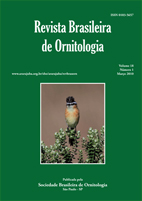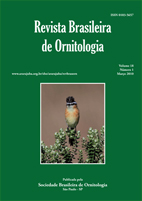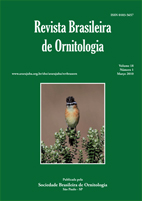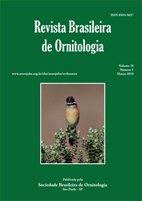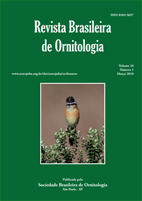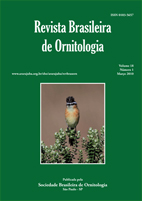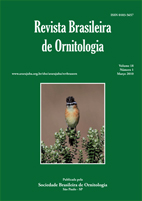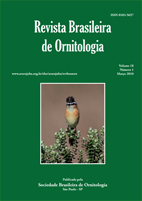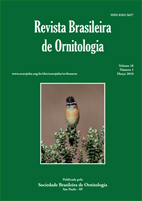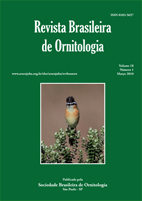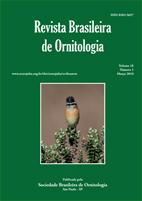Editor: Luis Fabio Silveira
São Paulo, SP
Pages: 71
São Paulo, SP
Pages: 71
Table of Contents
Article
| Birds of Tocantins, Brazil – 2: Jalapão region | ||
| José Fernando Pacheco, Fábio Olmos | 19 |
| Frugivory and seed dispersal of Ficus organensis (Moraceae) by birds in a Restinga Forest, Pelotas, RS | ||
| Fernanda Ribeiro Silva | 8 |
| Birds in squares of Lavras city: richness, similarity and influence of urban environment variables | ||
| Talita Vieira Braga, Antônio Carlos Silva Zanzini, Ricardo Augusto Serpa Cerboncini, Matusalém Miguel, Aloysio Souza Moura | 9 |
| Contribution to knowledge of the avifauna of Kaa-Iya National Park, Gran Chaco Department, Santa Cruz, Bolivia | ||
| Julián Vidoz, Miguel Aponte, Miguel Velásquez, Rudy Alarcón | 12 |
Note
| Black Vultures (Coragyps atratus) pick organic debris from the hair of a domestic dog in southeastern Brazil | ||
| Ivan Sazima | 5 |
| Commercial Eucalyptus plantation as communal night roosts of parrots Amazona spp.: selective convergence | ||
| Lucas Aguiar Carrara Melo, Luciene Carrara Faria, Paulo Tarso Antas, José Roberto Matos, Robert Cardoso Sartório, Evânio Trivilim Scopel | 7 |
| Breeding of Glaucidium brasilianum (Gmelin 1788) in the urban environment of Uberlândia, State of Minas Gerais | ||
| Welerson Santos Castro, Alexandre Gabriel Franchin, Oswaldo Marçal Júnior | 5 |
| First documented record of Frilled Coquette, Lophornis magnificus (Vieillot, 1817) for the State of Tocantins, Brazil | ||
| Gabriel Augusto Leite, Marco Aurélio Crozariol | 3 |
| Squacco Heron Ardeolla ralloides in the Fernando de Noronha Archipelago: the fourth Brazilian record with comments on the prospects for a colonisation event | ||
| Bradley James William Davis | 4 |
| Deformity del peak en el jardin tile Thraupis episcopus (Passeriformes: tanager) Venezuela | ||
| Carlos Verea, José Manuel Verea | 5 |
| Behaviour and diet of the Mantled Hawk Leucopternis polionotus (Accipitridae; Buteoninae) during deforestation of an Atlantic Rainforest landscape in Southeast Brazil | ||
| Luiz Fernando Salvador-Jr | 5 |
** The work of the Editor in Chief, Managing Office, Associate Editors, and the Editorial Council of Revista Brasileira de Ornitologia is strictly voluntary, and does not involve the use of any resources and infrastructure other than the personal ones**




